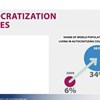1950
Women's rights in democratic transitions: A global sequence analysis, 1900–2012.
European Journal of Political Research 56: 735–756. DOI: 10.1111/1475-6765.12201 Abstract What determines countries’ successful transition to democracy? This article explores the impact of granting civil
Cognitive ability and fertility among Swedish men born 1951–1967: evidence from military conscription registers
Proceedings of the Royal Society B, 286 (1902) Abstract We examine the relationship between cognitive ability and childbearing patterns in contemporary Sweden using administrative register data. The top

Modern Vikings in the East. Sweden’s Role in 1990’s Russian Economic Reforms: Institutions, Elite Networks, and Informal Practices
What role did Swedish institutions, experts, and elites play in the economic and political development in post-Soviet Russia, with corruption, tax evasion and the emergence of the oligarchy as a result?
Neopatrimonialism and the political economy of Economic Performance in Africa: Critical Reflections
Institute for Futures Studies Working Paper 2013:1. A revised version is published in World Politics, 1-50, 2015.
Artificial Intelligence, Datafication and Exploring the Minimum Content of Nationality
The Statelessness & Citizenship Review, 6(1), 124-129 COMMENTARY: Introduction Identifying the minimum content of nationality (‘MCN’), the inalienable core elements or conditions of citizenship witho
Three Routes to a Pension Reform. Politics and Institutions in Reforming Pensions in Denmark, Finland and Sweden
By analysing pension reforms in three Nordic countries – Denmark, Finland and Sweden that apply different institutional solutions in their old-age security programmes – the paper argues that the polit
A Life‐Course Analysis of Geographical Distance to Siblings, Parents, and Grandparents in Sweden
Population, Space and Place, VolumLäe 23, Issue 3, e2020, doi.org/10.1002/psp.2020 Abstract This study makes a contribution to the demography and geography of kinship by studying how internal migration
Population growth - how great are the risks and what factors affect risk levels?
The global population has increased dramatically since the year 1900 from approximately 1,6 billion to today's 8 billion. The UN estimates that world population will reach 11 billion by the year 2100.

Anna Lührmann: Walking the Talk. Which Parties Threaten Democracy?
The recent increase of democratic declines around the world has sparked a new generation of studies on the topic. Scholars agree that these days the main threat to democracy arises from democratically

Klaus Georg Hansen: Greenland – 300 years of colonisation
Since the formal colonisation of Greenland in 1721 by the Norwegian-Danish missionary Hans Egede Greenland has experienced five 'constitutional' breaks. Thus, seven distinct colonial eras can be ident








